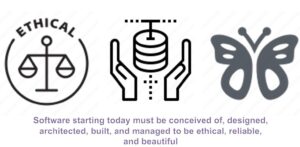Origin of the Ethical Software Lab
Dr. Mohammad Samarah, Founder of the Ethical Software Lab (ESL), established the lab with a vision to make software systems more transparent, trustworthy, and accountable to end users.
The conception of the Ethical Software Lab originated during a meeting focused on enhancing transparency in software systems specifically, how to communicate both the benefits and the potential intended and unintended effects of software to end users. During this discussion, Dr. Samarah proposed an innovative idea to adopt a familiar model of transparency, similar to the FDA’s Nutrition Facts label, and apply it to software applications and software-intensive devices.This vision gave rise to the Digital Nutrition Label (DNL)a framework designed to present essential information about software products in a clear, standardized, and accessible format. Through the DNL, ESL aims to promote informed decision-making, accountability, and ethical awareness in the development and use of software technologies.
Our Mission
At the heart of ESL’s mission is the commitment to developing methodologies for certifying the ethicality of software and software-intensive products. In an era where digital privacy often takes a backseat to functionality, we stand at the forefront for user rights, ensuring software acts only in the users intended interest, transparently and responsibly.
Our Vision
Our vision is to become the trusted and go-to lab for reliable, independent, and accurate ethicality verification of software applications and software-intensive products for users, consumers, and software developers. We strive to be a valued educational resource for how to use software while maintaining well-being, ethical use, and privacy. Through our efforts, we envision a future where users can confidently rely on software to be safe, respectful of privacy, and ethically designed, contributing to a more trustworthy digital world.
Why Software Ethics Matters?

Software ethics is more than a guideline; it’s a necessity. In today’s interconnected world, ensuring software integrity is vital not just for personal cybersecurity but for the public’s safety as devices and services become increasingly integrated into our daily lives. The ESL’s work champions this cause, aiming to instill confidence among users and the public about the digital tools they use every day.